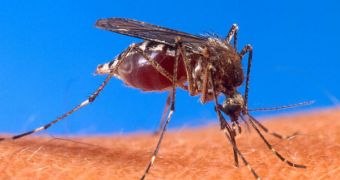Mosquitoes are one of the main problems of the underdeveloped world, because they are the main carriers of diseases such as dengue and yellow fever, as well as malaria, conditions that wreak havoc in areas where people have no means of defending themselves against the bites. On account of the fact that spraying with insecticides only makes future bug generations resistant to their effects, scientists have deemed it necessary to devise a way in which to especially target the oldest mosquitoes.
If they die, then the new generation's ability of producing offspring able to resist the effects of insecticides would considerably diminish, to the point where their predecessors would also be killed by the sprays. This would ensure that no bug would be able to breed and that some of the world's most wide-spread viruses could finally be stopped dead in their tracks, if not completely eradicated.
“Insecticides sprayed on house walls or bed nets are some of the most successful ways of controlling malaria. But they work by killing the insects or denying them the human blood they turn into eggs. This imposes an enormous selection in favor of insecticide-resistant mosquitoes. If we killed only older mosquitoes, we could control malaria and solve the problem of resistant mosquitoes. This could be done by changing the way we use existing insecticides, even by simply diluting them,” Pennsylvania State University (Penn) Biology and Entomology Professor Andrew Read explained.
“It is one of the great ironies of malaria. Most mosquitoes do not live long enough to transmit the disease. To stop malaria, we only need to kill the old mosquitoes,” Read, who has been the leader of the team behind the insecticide research, added. Details of the find have appeared on April 7th in the scientific journal PLoS biology. “We are working on a fungal pesticide that kills mosquitoes late in life. We could spray it onto walls or onto treated materials such as bed nets, from where the mosquito would get infected by fungal spores,” Penn Entomology Professor Matthew Thomas, who has also been part of the research, shared.
“This means that late-life insecticides will be useful for much, much longer – maybe forever – than conventional insecticides. Insects usually have to pay a price for resistance, and if only a few older mosquitoes gain the benefits, evolutionary economics can stop resistance from ever spreading,” Read added. Because the team work with a biopesticide, it may be easier for them to target older mosquitoes for a simple reason – it takes 20 to 14 days for the disease to be transmitted, and the fungus in the chemicals acts within 10 to 12 days. So, naturally, only the older insects will die from it.
“Insecticides that kill indiscriminately impose maximal selection for mosquitoes that render those insecticides useless. Late-life acting insecticides would avoid that fate. Done right, a one-off investment could create a single insecticide that would solve the problem of mosquito resistance forever,” Read concluded.

 14 DAY TRIAL //
14 DAY TRIAL //